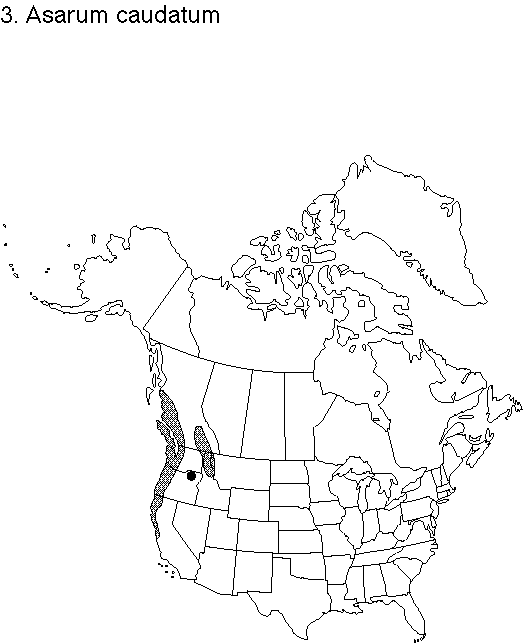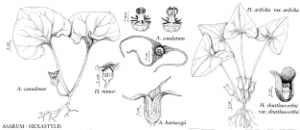Asarum caudatum
Edwards's Bot. Reg. 17: footnote after plate 1399. 1831.
Rhizomes horizontal, shallow, internodes (0.5-)1.5-6.5 cm. Leaves: petiole 7.5-17 cm, sparsely crisped-hirsute. Leaf blade not variegate, cordate, 3-8.5 × 4.5-12 cm, apex usually obtuse, occasionally broadly acute; surfaces abaxially sparsely appressed-hirsute, at least proximally, adaxially glabrous or sparsely appressed-hirsute, marginal hairs perpendicular to margin or curved toward apex. Flowers horizontal; peduncle 1.5- calyx tube cylindric, externally brown-purple, rarely greenish, hirsute, internally white, usually with median purple stripe, with usually purple, rarely white hairs; distal portion of sepal spreading or weakly (rarely strongly) reflexed at anthesis, (11-)30-75 mm, apex filiform-attenuate, abaxially purple or greenish, sparsely hirsute, adaxially purple, puberulent with crisped purple hairs; pollen sacs 1.5-2 mm, sterile tip of connective on inner stamens purple, 0.5-1 mm, shorter than pollen sacs. 2n = 26.
Phenology: Flowering spring–summer (Apr–Jul).
Habitat: Understory of conifer forests, usually in mesic or wet places
Elevation: 0-1200(-2200) m
Distribution

B.C., Calif., Idaho, Mont., Oreg., Wash.
Discussion
In most populations of Asarum caudatum, the distal portion of the sepal is spreading or weakly reflexed and 30-75 mm. A single population south of Mt. Shasta, California, has the distal sepals strongly reflexed and unusually short, often as little as 1.1 cm. Flowers of these plants superficially resemble those of A. lemmonii; they differ in being horizontal, not descending as in A. lemmonii, and in the filiform-attenuate sepals.
Native Americans used Asarum caudatum medicinally to treat headaches, intestinal pain, knee pain, indigestion, boils, tuberculosis, and colic, and as a general tonic (D. E. Moerman 1986).
Selected References
None.
